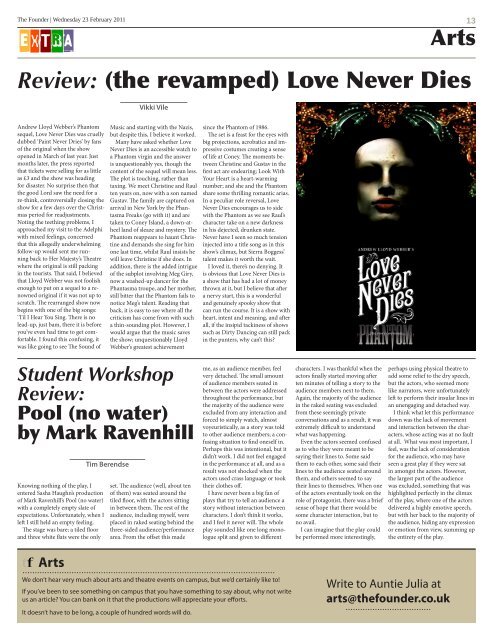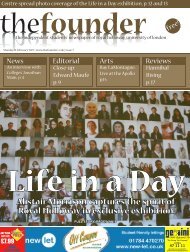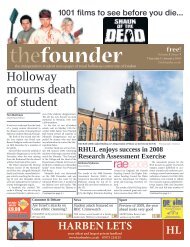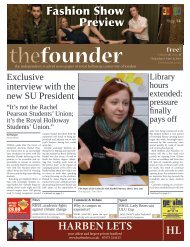You also want an ePaper? Increase the reach of your titles
YUMPU automatically turns print PDFs into web optimized ePapers that Google loves.
<strong>The</strong> <strong>Founder</strong> | Wednesday 23 February 2011<br />
E X T R A<br />
13<br />
Arts<br />
Review: (the revamped) Love Never Dies<br />
Vikki Vile<br />
Andrew Lloyd Webber’s Phantom<br />
sequel, Love Never Dies was cruelly<br />
dubbed ‘Paint Never Dries’ by fans<br />
of the original when the show<br />
opened in March of last year. Just<br />
months later, the press reported<br />
that tickets were selling for as little<br />
as £3 and the show was heading<br />
for disaster. No surprise then that<br />
the good Lord saw the need for a<br />
re-think, controversially closing the<br />
show for a few days over the Christmas<br />
period for readjustments.<br />
Noting the teething problems, I<br />
approached my visit to the Adelphi<br />
with mixed feelings, concerned<br />
that this allegedly underwhelming<br />
follow-up would sent me running<br />
back to Her Majesty’s <strong>The</strong>atre<br />
where the original is still packing<br />
in the tourists. That said, I believed<br />
that Lloyd Webber was not foolish<br />
enough to put on a sequel to a renowned<br />
original if it was not up to<br />
scratch. <strong>The</strong> rearranged show now<br />
begins with one of the big songs:<br />
‘Til I Hear You Sing. <strong>The</strong>re is no<br />
lead-up, just bam, there it is before<br />
you’ve even had time to get comfortable.<br />
I found this confusing, it<br />
was like going to see <strong>The</strong> Sound of<br />
Music and starting with the Nazis,<br />
but despite this, I believe it worked.<br />
Many have asked whether Love<br />
Never Dies is an accessible watch to<br />
a Phantom virgin and the answer<br />
is unquestionably yes, though the<br />
content of the sequel will mean less.<br />
<strong>The</strong> plot is touching, rather than<br />
taxing. We meet Christine and Raul<br />
ten years on, now with a son named<br />
Gustav. <strong>The</strong> family are captured on<br />
arrival in New York by the Phantasma<br />
Freaks (go with it) and are<br />
taken to Coney Island, a down-atheel<br />
land of sleaze and mystery. <strong>The</strong><br />
Phantom reappears to haunt Christine<br />
and demands she sing for him<br />
one last time, whilst Raul insists he<br />
will leave Christine if she does. In<br />
addition, there is the added intrigue<br />
of the subplot involving Meg Giry,<br />
now a washed-up dancer for the<br />
Phantasma troupe, and her mother,<br />
still bitter that the Phantom fails to<br />
notice Meg’s talent. Reading that<br />
back, it is easy to see where all the<br />
criticism has come from with such<br />
a thin-sounding plot. However, I<br />
would argue that the music saves<br />
the show; unquestionably Lloyd<br />
Webber’s greatest achievement<br />
since the Phantom of 1986.<br />
<strong>The</strong> set is a feast for the eyes with<br />
big projections, acrobatics and impressive<br />
costumes creating a sense<br />
of life at Coney. <strong>The</strong> moments between<br />
Christine and Gustav in the<br />
first act are endearing; Look With<br />
Your Heart is a heart-warming<br />
number; and she and the Phantom<br />
share some thrilling romantic arias.<br />
In a peculiar role reversal, Love<br />
Never Dies encourages us to side<br />
with the Phantom as we see Raul’s<br />
character take on a new darkness<br />
in his dejected, drunken state.<br />
Never have I seen so much tension<br />
injected into a title song as in this<br />
show’s climax, but Sierra Boggess’<br />
talent makes it worth the wait.<br />
I loved it, there’s no denying. It<br />
is obvious that Love Never Dies is<br />
a show that has had a lot of money<br />
thrown at it, but I believe that after<br />
a nervy start, this is a wonderful<br />
and genuinely spooky show that<br />
can run the course. It is a show with<br />
heart, intent and meaning, and after<br />
all, if the insipid tackiness of shows<br />
such as Dirty Dancing can still pack<br />
in the punters, why can’t this?<br />
Student Workshop<br />
Review:<br />
Pool (no water)<br />
by Mark Ravenhill<br />
Knowing nothing of the play, I<br />
entered Sasha Haughn’s production<br />
of Mark Ravenhill’s Pool (no water)<br />
with a completely empty slate of<br />
expectations. Unfortunately, when I<br />
left I still held an empty feeling.<br />
<strong>The</strong> stage was bare; a tiled floor<br />
and three white flats were the only<br />
Tim Berendse<br />
set. <strong>The</strong> audience (well, about ten<br />
of them) was seated around the<br />
tiled floor, with the actors sitting<br />
in between them. <strong>The</strong> rest of the<br />
audience, including myself, were<br />
placed in raked seating behind the<br />
three-sided audience/performance<br />
area. From the offset this made<br />
me, as an audience member, feel<br />
very detached. <strong>The</strong> small amount<br />
of audience members seated in<br />
between the actors were addressed<br />
throughout the performance, but<br />
the majority of the audience were<br />
excluded from any interaction and<br />
forced to simply watch, almost<br />
voyeuristically, as a story was told<br />
to other audience members; a confusing<br />
situation to find oneself in.<br />
Perhaps this was intentional, but it<br />
didn’t work. I did not feel engaged<br />
in the performance at all, and as a<br />
result was not shocked when the<br />
actors used crass language or took<br />
their clothes off.<br />
I have never been a big fan of<br />
plays that try to tell an audience a<br />
story without interaction between<br />
characters. I don’t think it works,<br />
and I feel it never will. <strong>The</strong> whole<br />
play sounded like one long monologue<br />
split and given to different<br />
characters. I was thankful when the<br />
actors finally started moving after<br />
ten minutes of telling a story to the<br />
audience members next to them.<br />
Again, the majority of the audience<br />
in the raked seating was excluded<br />
from these seemingly private<br />
conversations and as a result, it was<br />
extremely difficult to understand<br />
what was happening.<br />
Even the actors seemed confused<br />
as to who they were meant to be<br />
saying their lines to. Some said<br />
them to each other, some said their<br />
lines to the audience seated around<br />
them, and others seemed to say<br />
their lines to themselves. When one<br />
of the actors eventually took on the<br />
role of protagonist, there was a brief<br />
sense of hope that there would be<br />
some character interaction, but to<br />
no avail.<br />
I can imagine that the play could<br />
be performed more interestingly,<br />
perhaps using physical theatre to<br />
add some relief to the dry speech,<br />
but the actors, who seemed more<br />
like narrators, were unfortunately<br />
left to perform their insular lines in<br />
an unengaging and detached way.<br />
I think what let this performance<br />
down was the lack of movement<br />
and interaction between the characters,<br />
whose acting was at no fault<br />
at all. What was most important, I<br />
feel, was the lack of consideration<br />
for the audience, who may have<br />
seen a great play if they were sat<br />
in amongst the actors. However,<br />
the largest part of the audience<br />
was excluded, something that was<br />
highlighted perfectly in the climax<br />
of the play, where one of the actors<br />
delivered a highly emotive speech,<br />
but with her back to the majority of<br />
the audience, hiding any expression<br />
or emotion from view, summing up<br />
the entirety of the play.<br />
tf Arts<br />
We don’t hear very much about arts and theatre events on campus, but we’d certainly like to!<br />
If you’ve been to see something on campus that you have something to say about, why not write<br />
us an article? You can bank on it that the productions will appreciate your efforts.<br />
It doesn’t have to be long, a couple of hundred words will do.<br />
Write to Auntie Julia at<br />
arts@thefounder.co.uk














